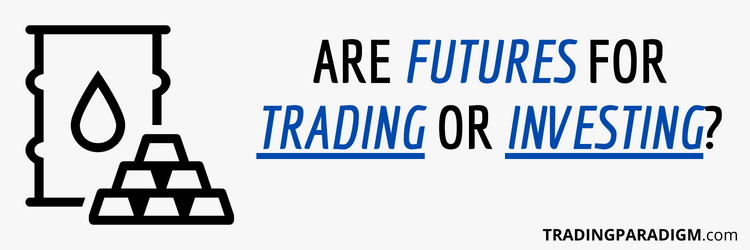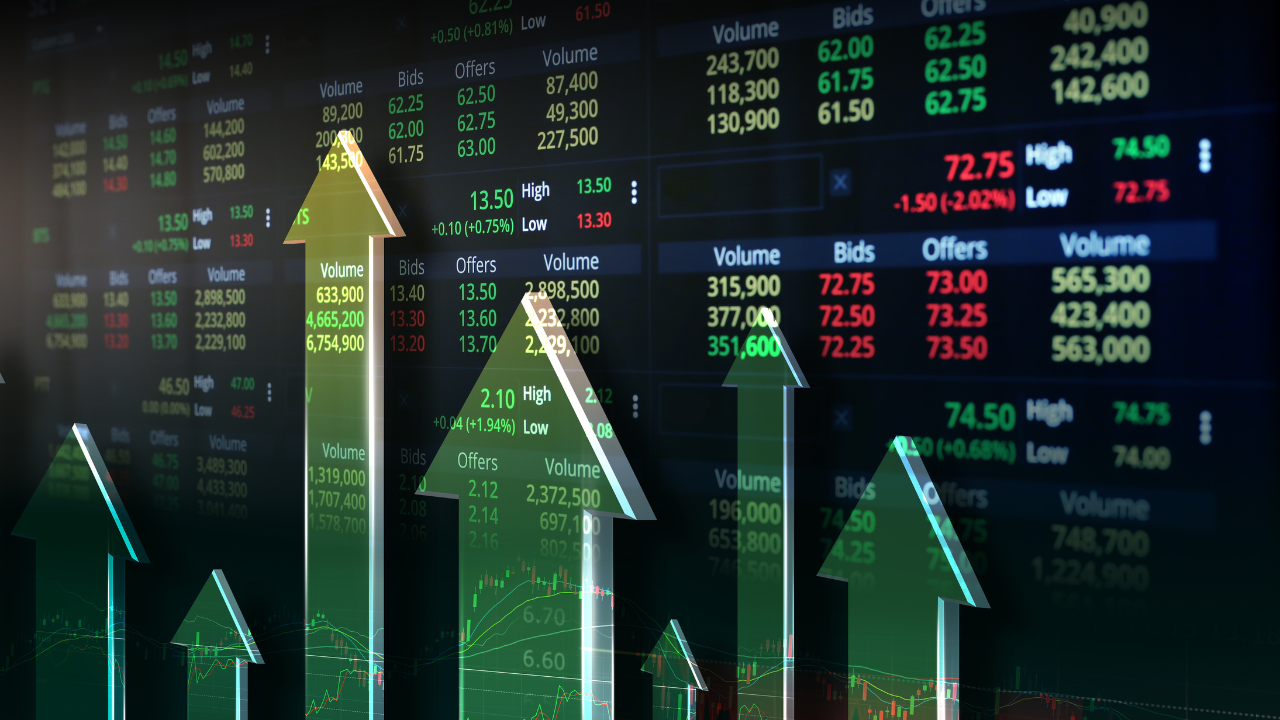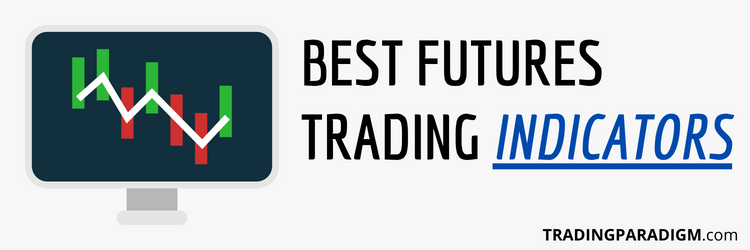Are Futures For Trading? Are Futures For Investing? Or Both?
As a self-directed trader/investor, you can choose to express risk in markets however you see fit.
But generally speaking, futures are best utilized as short-term trading vehicles as opposed to long-term investments. There are 2 main reasons for this: 1) futures contracts expire, and 2) they don’t represent ownership in the underlying asset.

A futures contract – by definition – is an agreement to buy or sell some underlying asset at some point in the future. But unless you’re the buyer, hold through expiration, and the contract has a physical settlement instead of cash – there is no ownership.
With the purchase of a stock/equity, for example, you’re purchasing ownership in that particular company (which comes along with voting rights, potential dividends, etc.). But derivative contracts like futures are agreements; not ownership stakes.
Futures contracts also expire regularly. Most expire on a monthly basis, but the e-mini S&P 500 (ES) – which is the main futures contract that I personally trade, has a quarterly expiration cycle (March, June, September, and December).
Since long-term investing in futures would require frequent maintenance of rolling contracts from one expiration to the next, they’re not really conducive to a passive, buy-and-hold style. Futures are much more applicable to short-term intraday trading.
Why Futures Don’t Get the Respect/Recognition That They Deserve:
For active retail traders, futures don’t get anywhere near the use/recognition they deserve in comparison to stocks, options, forex, and cryptocurrencies – and I think this is largely a result of perceived complexity. But they’re really not all that complicated.
Confusion often sets in when people hear the term “futures” and the definition that goes along with it: “an agreement to buy or sell an underlying asset at some point in the future”. But these things aren’t really telling of what futures are actually used for.
Futures markets were originally intended for commodity producers/consumers to “lock-in” acceptable prices in advance and not have to worry about drastic market fluctuations. This is the whole “agreement to buy or sell an underlying asset in the future” thing.
But the bulk of futures market activity disregards this definition. Most participants aren’t farmers, for example, protecting the yield of their current crop (which will be done growing in 3 months) by selling futures contracts right now to lock-in a sales price.
Instead, the vast majority of futures market activity comes from speculators who have no intention of holding contracts through expiration and making/taking delivery on a physical commodity. They’re simply looking to profit from short-term price movements.
Hedging isn’t uncommon, but there’s no shortage of individual & institutional futures traders attempting to capture directional moves.
Trading Futures vs. Stocks, ETFs, Options, Forex, Cryptocurrencies, etc.:
For long-term investing, I personally turn to stocks, ETFs, and even some cryptocurrencies. But when it comes to short-term intraday trading, I don’t think there’s any match for futures – they’re simply superior to everything else.
FUTURES vs. STOCKS
Stocks are pretty much the default for most people when they think about trading and investing. It’s just what they know. Talk of the “stock market” is mainstream, so most people have a general understanding of what it means to own stocks/shares.
Futures, on the other hand, simply aren’t as popular – and I think it’s a shame that most retail traders don’t really know about them. I traded stocks and options on an intraday basis for years before digging into futures and realizing their superiority.
For one, futures don’t have a pattern day trader rule – and they’re also far more capital-efficient and tax-friendly. But the biggest advantage to me is being able to trade the same futures product every single day and not have to constantly scan for “hot stocks”.
FUTURES vs. OPTIONS
From stocks, the typical next move is to venture into options. At least that’s what happened to me – and I know a lot of others who went down the same path. There are some simple ways to trade them, but options can be incredibly complex.
Like I mentioned earlier, there’s a perceived complexity in regard to futures – people have a hard time getting past the name/definition. But options truly are complex with price sensitivity (delta), time decay (theta), and all the other “greeks” that determine pricing.
Futures are quite simple in comparison – the mechanics are fairly straightforward. Don’t get me wrong, I think options can be a great avenue for expressing risk on multi-day/week time frames as opposed to futures. But there’s a fairly steep learning curve with options.
FUTURES vs. FOREX
In regard to forex, I’ve never really understood the appeal. So many people go down this route, but it’s at the absolute bottom of my list – especially for intraday opportunities. Truthfully, I don’t think I’ll ever touch the forex market. Plainly stated: it’s terrible.
If you’re a forex trader, please let me know your side of the story and what I might be missing here. But it seems clear to me that there are far better markets to trade in terms of transparency and regulation. The space is overflowing with gimmicks and manipulation.
Futures, for example, have oversight from one universal regulating body (The Commodity Futures Trading Commission) and provide a centralized exchange (Chicago Mercantile Exchange). Sadly, the same can’t be said for a market like forex.
FUTURES vs. CRYPTOCURRENCIES
Over the past decade, a lot of new traders are being attracted to trading through cryptocurrency markets. But a lot of the same concerns I have with forex, I have with crypto. It’s yet another space jam-packed with damaging and manipulative practices.
Forex and crypto are essentially the “wild west” of markets, so you have to be extremely careful operating within them. It’s hard to trust the educators, brokers, and other service providers operating within this space. Everything just feels – and typically is – shady.
Maybe it’s just my experience, but all of the best trading mentors I’ve personally come across operate almost exclusively within futures markets. There’s a level of legitimacy in their education/training/mentorship that I never came across elsewhere.
Conclusion – Futures Are the Clear Choice For Serious Intraday Traders:
To wrap things up, futures provide numerous benefits and are the ideal choice for skilled/competent intraday traders.
In terms of long-term investing, that’s a different story – I wouldn’t focus on futures as a vehicle for that purpose. But for short-term (especially intraday) trading, futures are far superior to everything else (stocks, options, forex, cryptocurrencies, etc.).
|Free Resources From the Best Futures Trading Mentors in the Industry|
|Discover the Best Futures Trading Courses Offering Expert-Level Training & Mentorship|
Of course, people have differing preferences – and they certainly have a right to their own opinions. But from an objective viewpoint, it’s hard to argue against futures. I think the lack of familiarity is the main thing holding people back.
Not only does the futures market itself offer incredible advantages (liquidity, regulation, flexibility, tax-friendliness, etc.), but everything surrounding futures markets is much more legitimate (brokers, educators, training & mentorship programs, etc.).
There are so many things that I wish I knew before I started trading – and recognizing the power of futures would be one of them. I had heard of futures early on, but I brushed them off for years in place of stocks, ETFs, and options.
Now I almost exclusively trade futures – and most of the best traders I know do the same – and it’s not a coincidence.
Written by Matt Thomas (@MattThomasTP)
Related Pages:
- Best Futures Trading Indicators – The Top 2 on My Charts
- Best Futures Trading Course With Expert-Level Mentorship
- Trade With Profile Training + Apteros Tryout = Pathway Pro
- Best Futures Trading Method – The Volume Profile Method
- Best Futures Trading Mentors – 3 of the Best in the Industry







I would emphatically agree with you that futures are the best for retail traders if you take the time to learn how to trade them. I spent a couple of years learning how to use algorithms to help me trade them and had a lot of fun. They shouldn’t be your only investment vehicle but from week to week they are a great way to generate income. I have stocks and cryptocurrencies for the long haul but if I trade shorter term it is definitely with futures. Forex is not very transparent and options were crazy complicated.